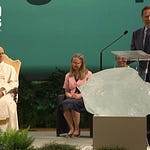Been a roller-coaster of a month, and we haven’t slept on it - even if we’ve felt a bit at sea. Who can sleep when you’re toggling between existential doomscrolling and manic moments of hope like the International Court of Justice Advisory Opinion?
Tacking between those may be the best we can do right now. Fortunately today’s guest has exactly the requisite experience to help.
We Start at the End
Today’s exit music is brought to you by The Pogues. Seems an unlikely choice until you reckon with the reality that Shane is the best frontman Tunbridge Wells [sic] (look it up) ever produced1, with an unaccountable flair for adapting sea shanties. The reasons might become clear.
Rear Admiral Neil Morisetti, CB (retired) had a storied Royal Navy career before becoming a diplomat on climate and energy issues for the UK, and now heads the Department of Science, Technology, Engineering and Public Policy at University College London.
He is the first flag officer we’ve had on the show, and has as clear-eyed perspective as anyone I’ve spoken to connecting climate change with national security.
You might not expect a career Royal Navy officer, former aircraft carrier commander, and former UK climate envoy to be among the most nuanced thinkers on climate resilience. But Admiral Morisetti’s been out in front of this conversation for over a decade, and stressed its importance to The Guardian in advance of the release of the UK’s 2025 Strategic Defence Review.
In recent months we’ve seen governments in Spain and other places start to re-classify essential climate adaptation spending as defence. And in a hybrid security/climate/humanitarian arrangement the government of Australia yesterday selected by lottery its first 280 climate resettlement visa recipients from Tuvalu - after 80% of the population applied.
Climate was named first amongst the persistent challenges global powers need to reckon with, ahead of terrorism and other factors, in the summary for that same Strategic Defence Review.
As Morisetti puts it: “There is no security solution to climate change. If the military gets involved, it means society has failed to act.”
In our conversation, we explore:
How the UK’s most recent Strategic Defence Review quietly ranked climate and environmental degradation as the first of its persistent threats.
Why net zero is struggling to maintain political consensus — and what kind of narrative could help rebuild it.
And how military procurement — from solar on forward operating bases to sustainable aviation fuel — could do more than reduce emissions: it could build markets.
Because here’s the thing: Western militaries are among the biggest institutional buyers on Earth. When NATO states agree that military aircraft should be able to operate with an increasingly concentrated mix including Sustainable Aviation Fuel (SAF) that’s not just logistics — that’s market-making. Morisetti argues that defence ministries shouldn’t just be consumers of low-carbon technology — they should be some of its most effective incubators.
In other words, climate tech needs to be mission-capable.
We also talked about the parts of the world where these intersecting threats — food shocks, climate migration, conflict — are already unfolding. And how the Arctic thaw is setting the stage for new flashpoints and opportunism — in both geopolitics and extraction.
What I took from this conversation is something I’ve been turning over ever since: that the old lines between defence, diplomacy, development, and decarbonization are disintegrating faster than most institutions can adapt. But there are people — like Morisetti — who’ve seen it coming, who’ve worked inside the system, and who are now trying to bend it toward something that might still hold.
He ends on a note of optimism. And I believe him.
In this Conversation
03:49 Military's Role in Climate Adaptation
04:44 Evolving Conversations on Climate Security
09:48 Military Innovations and Energy Efficiency
19:02 International Cooperation and Policy
28:29 Future Challenges and Strategic Planning
31:52 Conclusion and Final Thoughts
All the Outros
Good ideas can come from anywhere, they say. If you’re in Ireland you may get the next sentence - maybe remember that next time you hear someone give out about the ‘plastic Paddy’ diaspora.













